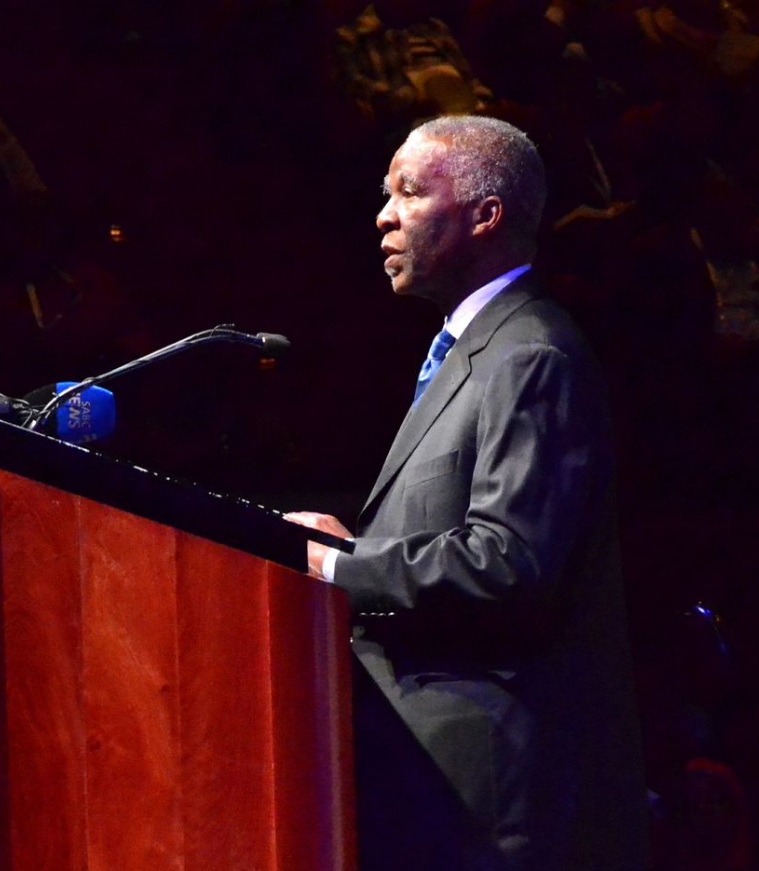Thabo Mbeki Foundation
We aim to promote and support the advancement of peace, democracy and prosperity in Africa and beyond.
The programme is guided by the vision and values of former President Thabo Mbeki, who has been a leading voice and actor in the African Renaissance.
The programme has three main areas of focus:
Flagship programmes
Conflict resolution and peacemaking
Flagship programmes
Democratisation
Flagship programmes
Economic development
Thabo Mbeki School
Our Focus Areas
The programme engages in research, policy analysis, advocacy, dialogue, capacity building, mediation and facilitation to address the challenges and opportunities facing Africa and its people.
01
Flagship programmes
Conflict resolution and peacemaking
The programme recognises that peace is a prerequisite for development and democracy, and that conflicts pose a serious threat to the stability and security of Africa and the world. The programme supports the efforts of African countries and regional organisations to prevent, manage and resolve conflicts through peaceful means, in accordance with the principles of African solutions to African problems, respect for human rights, sovereignty and territorial integrity.
The programme also supports the implementation of peace agreements, post-conflict reconstruction and reconciliation, as well as the prevention of relapse into violence. The programme works closely with various stakeholders, including governments, civil society, women, youth, religious leaders, traditional authorities, academics, media and international partners to foster a culture of dialogue, tolerance and cooperation.
Some of the activities of the programme include:
– Conducting research and analysis on conflict trends and dynamics in Africa
– Providing policy advice and technical assistance to mediation and peacebuilding efforts
– Facilitating dialogue and consultation among various actors involved in conflict resolution and peacemaking
– Supporting the capacity building of African institutions and mechanisms for peace and security
– Advocating for the respect of human rights, democracy and good governance in conflict situations
02
Educational Programmes
Democratisation
The programme believes that democracy is not only a system of government, but also a way of life that empowers citizens to participate in the governance of their countries and communities. The programme supports the consolidation and deepening of democracy in Africa by promoting democratic values, institutions and practices, such as constitutionalism, rule of law, human rights, free and fair elections, multipartyism, accountability, transparency, civic education and participation.
The programme also monitors and analyses the state of democracy in Africa and advocates for democratic reforms where needed. The programme engages with various actors, such as political parties, civil society organisations, electoral commissions, parliaments, judiciaries, media and regional bodies to strengthen their capacities and roles in advancing democracy.
Some of the activities of the programme include:
– Conducting research and analysis on democratic trends and challenges in Africa
– Providing policy advice and technical assistance to electoral processes and institutions
– Facilitating dialogue and consultation among various actors involved in democratisation
– Advocating for the promotion and protection of civil and political rights in Africa
03
Flagship programmes
Economic development, including combating illicit financial outflows
The programme acknowledges that economic development is essential for improving the living standards of Africans and reducing poverty and inequality. The programme supports the implementation of the African Agenda 2063 and the Sustainable Development Goals (SDGs) by promoting inclusive growth, industrialisation, diversification, regional integration, infrastructure development, trade facilitation, investment attraction and human capital development.
The programme also addresses the challenge of illicit financial outflows from Africa, which deprive the continent of vital resources for development. It is estimated, by the 2015 Mbeki-led Report of the High Level Panel on Illicit Financial Flows from Africa, that illicit financial flows cost Africa more than $50 billion annually. The programme advocates for measures to curb IFFs, such as strengthening anti-money laundering laws and regulations, enhancing tax administration and cooperation, improving transparency and accountability in natural resource management, recovering stolen assets and repatriating them to their countries of origin.
IFFs are illegal or illegitimate movements of money or capital from one country to another. They deprive African countries of resources that could be used for development purposes. They also undermine governance, accountability and transparency in Africa.
Some of the activities of the programme include:
– Conducting research and analysis on economic trends and issues in Africa
– Providing policy advice and technical assistance to economic planning and management
– Facilitating dialogue and consultation among various actors involved in economic development
– Supporting the capacity building of African institutions and mechanisms for economic integration
– Advocating for the curbing of illicit financial outflows from Africa
Thabo Mbeki Foundation
Programme Collaboration
The programme collaborates with various stakeholders, such as governments, private sector, civil society, academia, media and international organisations to generate knowledge, raise awareness and influence policies on economic development and illicit financial outflows.
